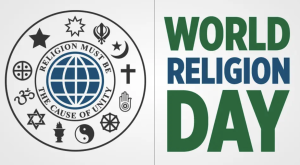There won’t be a single person working in HR that doesn’t want to promote the power of diversity at work.
Creating a psychologically safe work environment where employees feel confident to express their whole self is the very definition of an inclusive culture.
And despite a 2019 study by Deloitte revealing people still tend to engage in “covering,” a strategy to manage or downplay stigmatized identity aspects, such as race, gender, or sexual orientation – there is no doubt great strides have been made.
Events since then – such as the COVID-19 pandemic, Black Lives Matter, #MeToo, as well as increased focus on mental health and remote work and globalization – have lowed like tributaries into the river of human consciousness. We entered a period that I dubbed the ‘Great Recalibration’, requiring a systemic reset in workplace dynamics.
But despite advances in most aspects of diversity, there is one area that hasn’t – it seems – caught up: religion.
Religion and one’s core identity
University of Washington academics, Kernis & Goldman, define authenticity as “the unobstructed operation of one’s true- or core-self in one’s daily enterprise”. They argue that when people can act in accord with their core values, beliefs, self-representations, and motivations they do their best work and if they can do that where they are it will be the best place for them to work.
Despite the integral role of religion and spirituality in many people’s lives, discussing these topics in the workplace has been taboo.
In fact many organizations, even progressive ones, often shy away from inter-faith and non-faith dialogues due to concerns about offending colleagues, polarizing the workforce, or blurring professional boundaries or put their belonging status at risk.
The consequence of this however, is that many people – with strong religious beliefs – are often rendered inauthentic about this very core aspect of their identity.
That’s why it’s vital HR professionals make attempts to de-stigmatize these conversations.
So how can they do this?

Yesterday was ‘World Religion Day 2024’ – an event that happens every third Sunday of the year. It is aims to promote understanding and peace between all religions, and encourages people to learn about other faiths and their followers. The first such day was observed in 1950.
I believe this day offers organizations a unique opportunity to appreciate and respect diverse religious traditions and beliefs.
It is essentially a call to engage in interfaith dialogues and promote a harmonious and inclusive society.
It is also a wonderful opportunity to ‘give thanks’ for the blessing of having people of faith in the workplace.
Companies should celebrate any rise in people feeling confident to talk about their faith at work.
In addition to what’s already been said about encouraging discussions about faith and its impact on demonstrating commitment to fostering inclusion, there are several other reasons why promoting religious tolerance matters:
- When employees feel comfortable sharing aspects of their personal lives, including faith, they are likely to feel valued and respected for who they are and not just what they do, making them feel more engaged.
- By fostering a culture that promotes understanding and respect among co-workers we get value from diversity by managing inclusion.
- When people respect and accept us for who we are it strengthens the bonds of trust that trust builds empathy, and they combine to transform polite co-operation into powerful collaboration.
- Decision making and ideation benefit from cognitive diversity. Spiritual people see the world through a spiritual lens; these perspectives can offer exciting and innovative ways of solutioning. Think, for example, how spiritual practice has enriched the health and wellness agenda.
- In the knowledge economy companies known for their inclusive cultures are more likely to attract and retain the world’s best talent. People are drawn to workplaces where they feel they can be their authentic selves.
- It strengthens team bonds by sharing and honoring different identity aspects, including religion.
- It acknowledges that people’s beliefs are important to them, and they should be able to trust in their organization’s good intent.
I think we all need to step back sometimes and realize that cultural fluency is crucial to operating effectively in our globalized world.
Globalization and diversity lowered the barriers that once separated cultures, both internationally and domestically (Garneau & Pepin, 2015).
Working and living in a global society requires the ability to create interactions and relationships with people who are different from oneself.
In many instances, part of that difference is that religion and culture are parts of each other. Culture affects religion, and religion affects culture.
Understanding and respecting different faiths is crucial. It prepares employees to interact effectively with diverse clients and colleagues globally.
Ultimately, religious tolerance counters fundamentalist stereotyping, a simplistic, generalized, and negative categorization that creates alienation.
I wonder for example how many of the people that work in your organization know that World Religion Day, whose founding purpose was to encourage people of all backgrounds to explore the teachings and principles of various religions and to promote unity and understanding among different faiths, was established by the Bahá’í faith.
This was developed in Iran and parts of the Middle East in the 19th century. Its founder, Baháʼu’lláh, viewed humans as fundamentally spiritual beings and called upon individuals to develop divine virtues and further the material and spiritual advancement of society.
Increase at-work harmony
Holding space for religious and spiritual expression at work, while respecting everyone’s beliefs (including un-beliefs), can significantly enhance workplace harmony, employee satisfaction, mental health, productivity, loyalty, and combat stereotypes and prejudices. In today’s economy, the importance of business ethics, rooted in the principles of true religion and spirituality, cannot be overstated.
Ultimately it comes to this: Can I be me and let you be you.
If I can, we can. Then, we have found something magical – because authenticity has been shown to positively impact well-being, self-esteem, life satisfaction, and the fulfillment of basic needs like relatedness, competence, and autonomy (Harter, 2002; Sheldon & Elliot, 1999).
Embracing religious and spiritual diversity in the workplace is not just about breaking taboos but about harnessing the power of authenticity for the betterment of individuals and organizations alike.
We should all say a rousing “Amen” to this transformative approach in modern workplaces.
Why should anyone be made to feel ashamed of their respective gospels? It is, after all, the power of God that brings hope to all and not just some.
